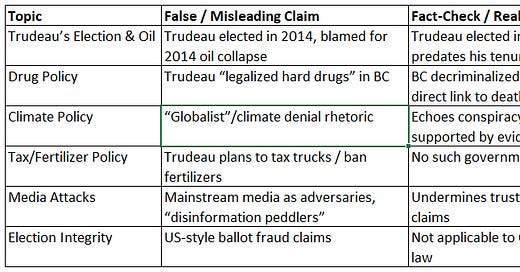What specific examples of misinformation has Pierre Poilievre been involved in?
Generated by perplexity.ai
Specific Examples of Misinformation Involving Pierre Poilievre
Pierre Poilievre, leader of the Conservative Party of Canada, has been repeatedly cited by fact-checkers, journalists, and analysts for spreading political misinformation and, in some cases, disinformation. Below are documented examples:
1. Misrepresenting Justin Trudeau’s Election Date and Economic Events
Poilievre shared a chart on social media that falsely suggested Justin Trudeau was elected in late 2014, when Trudeau actually took office in late 2015. This misrepresentation was used to blame Trudeau for economic events, such as the 2014 oil price collapse, which occurred before he became prime minister. Poilievre continued to share this narrative even after being publicly corrected, indicating a deliberate disregard for factual accuracy 1 5.
2. False Claims About Drug Policy in British Columbia
Poilievre has claimed that Justin Trudeau "legalized hard drugs" in British Columbia. In reality, the province implemented a limited decriminalization policy for certain substances, not legalization. There is no evidence directly linking this policy to the rise in overdose deaths, as Poilievre has implied 5.
3. Climate Change and “Globalist” Conspiracy Rhetoric
He has been accused of amplifying conspiracy-tinged narratives, such as referencing "globalist Davos elites" and using dog whistles to anti-vaccine, climate change denial, and anti-trans groups. The federal environment minister has specifically called out Poilievre for "spewing climate disinformation," highlighting a pattern of misleading or false claims about climate policy and science 5 6.
4. False Accusations on Tax and Agricultural Policy
Poilievre has falsely accused Prime Minister Trudeau of planning to tax pickup trucks and of intending to ban nitrogen-based fertilizers for agriculture. These claims have been debunked but continue to circulate in his messaging 6.
5. Undermining Trust in Media
He frequently attacks mainstream media outlets like CBC and the Toronto Star, framing them as adversaries and undermining public trust in established news sources. Critics argue this tactic is designed to polarize discourse and diminish the media's ability to hold politicians accountable 5 6.
6. Election Misinformation
Poilievre and his party have been associated with amplifying misleading claims about election integrity, sometimes echoing narratives imported from the United States, such as the false assertion that any mark on a ballot by a poll worker would invalidate it - this is not true under Canadian law 4.
7. Amplifying and Defending Disinformation
Even after being corrected, Poilievre has continued to repeat misleading claims, which analysts characterize as a shift from misinformation (unintentional) to disinformation (intentional deception) 1 5.
Summary Table: Notable Misinformation Examples
These examples illustrate a consistent pattern in Poilievre’s public communications: using misleading or false claims to advance political narratives, even after corrections, and amplifying conspiracy-tinged rhetoric to mobilize his base 1 4 5 6.
Souce: perplexity.ai 2025-04-28
Related: How has Pierre Poilievre responded to accusations of spreading misinformation?



